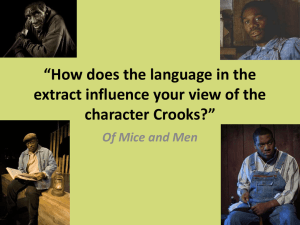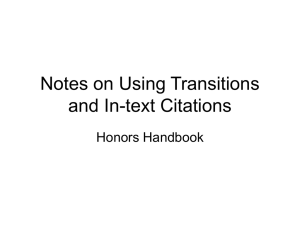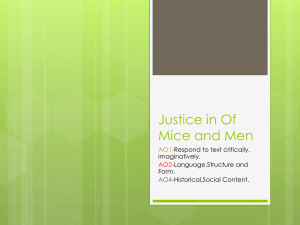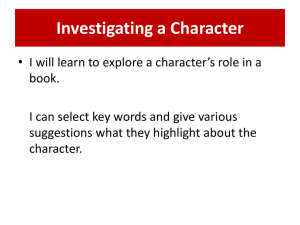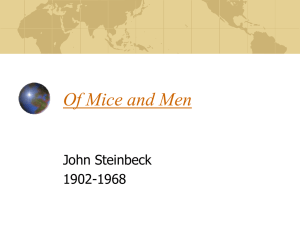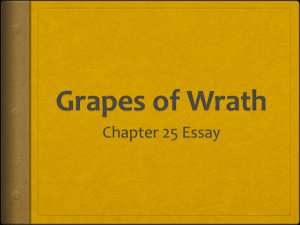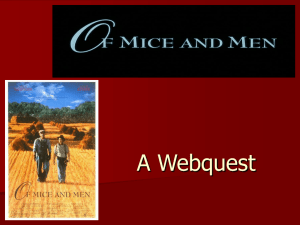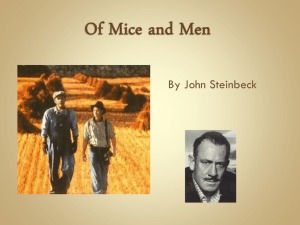set_3_Controlled_Assessed_W
advertisement
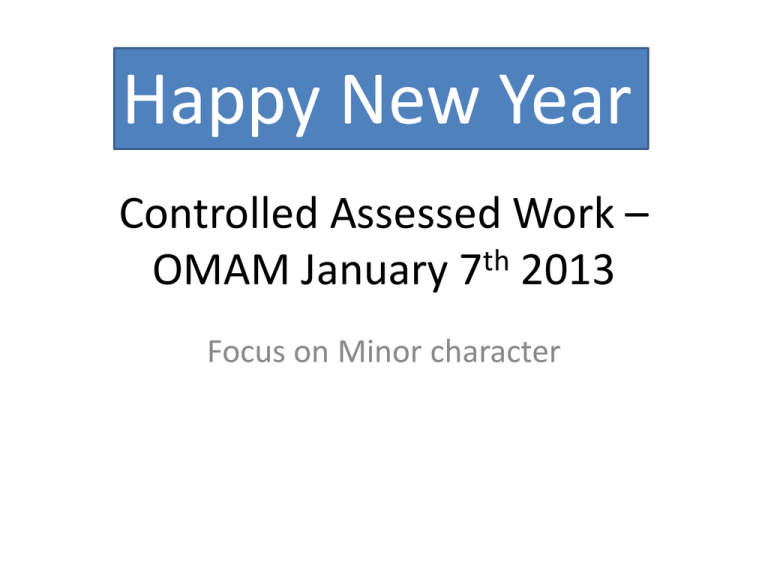
Happy New Year Controlled Assessed Work – OMAM January 7th 2013 Focus on Minor character What can you remember from last term about Crooks? • • • • • Who is he? What is his position on ranch? Where does he live? How is he treated? What does Crooks feel about his own life on the ranch? • Who shows that they do like and trust him? • Who insults him? The essay title • Explore the ways Steinbeck presents and develops the character Crooks in chapter four. How does this character contribute to the major themes of the novel? • Remember to include detailed analysis of the ways language, form and structure are used by the author to present the character at key moments • Don’t forget to include your personal responses to the character and themes Preparing the notes .... • Chapter four opens with a detailed description of Crooks’ living quarters – direct ‘stage setting’ (remember it was originally going to be a play). • Steinbeck uses the description of the room to highlight aspects of Crooks personality and his lifestyle. • Choose any small detail from the opening paragraph and comment upon it. Modelling a response PQE • Steinbeck paints an image of Crooks through the details of his living quarters. • ‘Crooks had his bunk in the harness room’ • The opening sentence makes it clear that this is not a proper bedroom but a place of work. Perhaps this shows that Crooks is never free from his labours but also shows that he is segregated from the other men and kept in the realm of the animals who also live in the barn. This could be Steinbeck’s way of alerting us to the prejudice of the times and the isolation this caused for a man like Crooks, ‘the negro stable-buck’. How does Steinbeck use adjectives to build up a visual image of Crooks? • • • • • • • • Proud Aloof neat Crooked Deep Thin Pain-tightened Here Steinbeck is suing direct description to paint a picture for the reader. 9.1.2013 Steinbeck describes actions • Saturday night – what is Crooks doing? • ‘A bottle of liniment ...he rubbed his spine ..he flexed his muscles.... He shivered’ • How are you affected by this description of him on a Saturday night alone in his room with the small electric globe which threw a ‘meagre yellow light’? Which words make the greatest impact? Steinbeck uses Symbolism p74 • In the stable buck’s room a small electric globe threw a meager (thin, weak) light. • This small, weak light perhaps reflects the lack of hope and joy in Crooks’ life. The room is full of shadows; Crooks’ life is also shadowed by the racial prejudice he suffers and the loneliness he feels. Voice and speech – analysing form p 74 • What kind of voice does Steinbeck give Crooks when Lennie first approaches him? • Crooks said sharply.. (sharply is an adverb describing the action) • He uses short, abrupt sentences. Find an example. Why? What is the impact of these curt sentences? • Curt aggressive hostile bitter unwelcoming • antagonistic 10.1.2013 How does Steinbeck present Crooks through his conversation with Lennie? P76 • Grumpy? Lonely? Longing for company? Eager to talk? Insulting to Lennie? Nostalgic for past? Regretful? Perceptive (about George and Lennie’s relationship)? full of life and energy? • P78-79 Cruel and sadistic? Eager to wield some power? What happens to the emotional temperature across these two pages? • Write two sentences about the change in emotions over these pages starting with this phrase .. Steinbeck creates emotional tension when... Page 80 • How does Steinbeck show us that Crooks is a deeply lonely character? Through..... • Do you feel sorry for him? Page 81 – Crooks is cynical about the dream (doesn’t believe in it) • Point : Crooks is scornful about the American Dream. • Quote: Nobody... • Explore • Can you find another comment on page 83 which supports this idea that Crooks is contemptuous of the mens’ dreams? SDP • Deep • Crooks speaks of ‘heaven’ and ‘land’ with the bitter voice of long experience. He has seen so many men come and go; the dream they all share is a fantasy which both tortures and delights their imaginations. • Profound. Crooks speaks out of a dark, atheist misery due to the sadness of his own tortured existence. For him ‘heaven’ is a religious fairytale which offers no consolation for the horrors of his lonely life. He has no faith in the dream vision of sacred land. The double negative ‘nobody never’ intensifies his bitter depression. Your Essay • What is Crooks like as a character? • How does Steinbeck reveal all his characteristics to us? (look for his skill as a writer) • Why and how is Crooks significant to the themes of the book? • What do you feel about Crooks? 82 Steinbeck manipulates the scene by adding another character - Candy • Crooks is secretly delighted to have company and friendship – highlighting the problem of isolation which Steinbeck cares about so much. How does he react to Candy? (actions, behaviour, voice) page 82 • How can we tell that Crooks is really quite a friendly approachable character if given a chance? Bitter irony • Candy is embarrassed about the awkward social situation and compliments Crooks on his room. Crooks replies, ‘Sure. And a manure pile under the window. Sure, it’s swell. ’ • Through the ironic use of the colloquial term swell and the connotations of manure, Crooks shows his bitter knowledge that his ‘privileged’ room is really little more than an animal’s den. He resents Candy’s pretence that it is a luxury pad. 84 Steinbeck develops Crooks!!! • The Dream – suddenly, against all his spoken disbelief and scorn, Steinbeck reveals that Crooks too is a romantic dreamer, longing to escape his trap of poverty, misery and abuse! • There is softness and gentleness within Crooks. • How do we know this? Shallow Deep Profound p 80 • ‘I seen things out here’ This quote shows Crooks is potentially going mad (shallow) • Through this comment Steinbeck reveals Crooks’ fears that loneliness is slowly driving him mad. (deep) • Crooks uses a short dramatic statement which displays his suffering in his isolation. He has had frightening visions which threaten his sanity. His word ‘things’ hints at terrible ghostly sights. (profound) Another character enters – Curley’s wife – Steinbeck is building up the scene • Practise your PQE skills – your Chance for teacher feedback on your writing How does Steinbeck use the scene with Curley’s wife to show us more about Crooks and his feelings? About his power or lack of it? • 1. Crooks does not speak for two pages – why not? • 2. Crooks speaks up again page 88 • 3. Crooks makes his final comments p90-91 Thursday 17th Jan • LO • Get ready to write – last chance to fine tune your commentary to achieve top grades. • Evaluate how well Steinbeck uses different techniques to establish aspects of Crooks and his existence. Respond to another group • What do you think are some of the more subtle emotions displayed by Crooks at a various points in the scene we have read? When is Steinbeck most effective? • • • • Group work Techniques used to reveal emotion Direct description of emotion Dialogue – words, expression, tone, pace (implicit meaning) • Body language and gesture • Action • Highlight and discuss the effectiveness of the examples you can find in this section of chapter 4 Introduction • We are going to practise our introduction • Steinbeck presents Crooks (in a number of ways) • Why is he an interesting or intriguing character? • How does he contribute to the themes of the the whole text? Start with a powerful introduction • Steinbeck presents Crooks (in a number of ways) • Why is he an interesting or intriguing character? • How does he contribute to the themes of the whole text? • What do you feel about him? • Start with an adjectival phrase e.g. Bitter, lonely and rejected, Crooks .... Or outcast from human company, Crooks ..... How does Steinbeck present Crooks • Through • Direct description using adjectives, adverbs (his room, himself) • Dialogue – words, expression, tone, pace, (implicit meaning) talking to other characters • Body language and gesture • Actions • Which is the most effective device? Monday 21st January • • • • • • • • The CA begins --do you have... Good Pen? Clear Plan? Secure sense of what you need to do to impress the marker? Don’t forget .... Offer Deep and Profound PQE Evaluate the quality of Steinbeck’s presentation of Crooks Respond personally to the text The essay title • Explore the ways Steinbeck presents and develops the character Crooks in chapter four. How does this character contribute to the major themes of the novel? • Remember to include detailed analysis of the ways language, form and structure are used by the author to present the character at key moments • Don’t forget to include your personal responses to the character and themes
